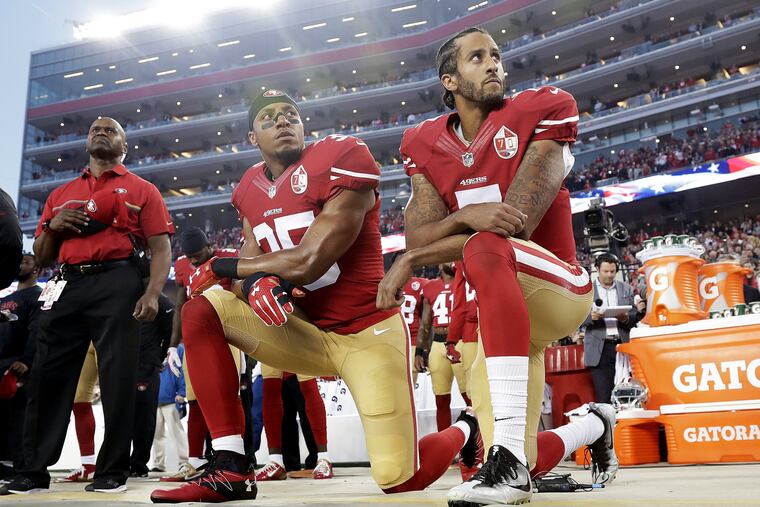Radical plays: Activist athletes are nothing new | Opinion
Athletes across sport, race, gender, and religion are speaking out against injustice. But it's not the first time.

No one invited 1968 Olympians Tommie Smith and John Carlos to the White House after they won their medals. Instead, Smith got a package in the mail filled with cow manure, and Carlos received death threats.
It wasn't Smith's gold medal or Carlos' bronze that earned them these insults, but the moment on the podium representing a country at war with itself and in Vietnam when Smith and Carlos bowed their heads and raised their fists together. This display was a moment of resistance for both black Americans and the Olympic Project for Human Rights.
The recent NFL players' protests are not a new thing — they are a part of an important American tradition, when engaging in professional sports means engaging one's social conscience.
>>READ MORE: Letters: National anthem protest – fighting injustice or showing disrespect?
In the 1940s, Jackie Robinson fought against racist owners and fans to become the first black player in Major League Baseball, leading the way for stars like Hank Aaron and Willie Mays in the '50s. In the '60s, Muhammad Ali championed black power and refused to be drafted to the war in Vietnam. In 1973, Billie Jean King demanded equal pay for female athletes and at the Battle of the Sexes showed she was not just equal to her male counterpart, but better. Two months after that match, Arthur Ashe was the only black player in the South African Open and later co-chaired the committee Artists and Athletes Against Apartheid. Kareem Abdul-Jabbar boycotted the 1968 Olympics because of the racial climate in the United States, became one of America's first star Muslim athletes in the '70s, and wrote opinion pieces for Time on social injustice.
These athletes knew they weren't just entitled to their own opinion, but that they were expected to have one — at least by those fans who elevated sports figures to heroes and role models.
>>READ MORE: The NFL says it supports protests, but instead it's making them invisible | Bob Ford
That is, until the money started coming in.
Around 1990, global capitalism entered American sports, and some athletes started avoiding activism when it began interfering with lucrative sponsorships, like Michael Jordan's relationship with Nike. This heralded the "Age of Jordan," as Amy Bass, professor and editor of In the Game: Race, Identity, and Sports in the Twentieth Century, calls it as she points out the gap in activism after global capitalism entered American sports.
After being arrested for carrying a gun and fighting with drunks, Charles Barkley announced in 1993 that he was not a role model. Two years later, the controversial story appeared that Michael Jordan had refused to support a black Democratic candidate in his home state of North Carolina against Jesse Helms because, as Jordan said, "Republicans buy shoes too."
The "Age of Jordan" became the age of remaining politically indifferent, so as not to risk fan support and profits. But it looks like that era has come to an end. Louis Moore, professor and author of We Will Win the Day: The Civil Rights Movement, the Black Athlete, and the Quest for Equality, says the Black Lives Matter movement has pushed athletes to use their platforms in a similar way to during the civil rights movement.
>>READ MORE: Malcolm Jenkins chooses handwritten signs instead of spoken words to convey message after White House cancellation
Athletes across sport, race, gender, and religion are speaking out against injustice, from WNBA star Breanna Stewart, to Olympic fencer Ibtihaj Muhammad and Colin Kaepernick and LeBron James. In Philly, Malcolm Jenkins has set an example with his protests, by visiting Congress, and by going on a ride-along with Philadelphia police.
Jenkins and others have made it clear that they are not anti-American or anti-military, but are against racial and social injustice.
This sounds similar to what Tommie Smith said about the 1968 Olympics: "We were just human beings who saw a need to bring attention to the inequality in our country. I don't like the idea of people looking at it as negative. There was nothing but a raised fist in the air and a bowed head, acknowledging the American flag — not symbolizing a hatred for it."